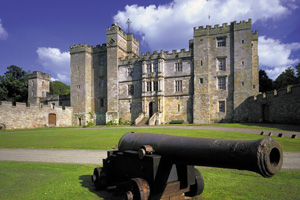Elizabeth | 1997


- Locations |
- Derbyshire;
- Northumberland;
- Co Durham;
- North Yorkshire;
- Berkshire;
- Greater London
- DIRECTOR |
- Shekhar Kapur
A host of striking British locations give an impressively epic sweep to Shekhar Kapur’s account of power politicking in the Tudor court.
The young Elizabeth grew upon the estate of what is now Hatfield House in Hertfordshire and, although the house itself is now a frequently used film location (it actually appears in sequel Elizabeth: The Golden Age), its appearance was radically altered during the Jacobean period.

For the film, Haddon Hall, just south of Bakewell, Derbyshire, is substituted. Haddon has previously featured in the 2005 film of Pride and Prejudice, with Keira Knightley and Matthew MacFadyen, Rob Reiner’s The Princess Bride, the 2011 version of Jane Eyre (as well as Franco Zeffirelli’s 1996 version of Jane Eyre), and Trevor Nunn’s Lady Jane, with Helena Bonham-Carter. More recently, it’s been seen in The Other Boleyn Girl.

Northumberland supplied several locations. The burning of the Protestant martyrs at ‘Bishopsgate, London’ is Alnwick Castle, which has, of course, since found fame as one of the ‘Hogwarts’ locations in the first two Harry Potter films. Alnwick also becomes ‘Leith Castle’, where Mary of Guise (Fanny Ardant) sends a message to Elizabeth after her disastrous raid.

About 10 miles from Alnwick stands Chillingham Castle, which supplies both the interior of ‘Leith Castle’ and the hunting lodge, where Elizabeth meets up with Robert Dudley (Joseph Fiennes). A stronghold since the 12th century, Chillingham became a fully fortified castle in 1344, and it’s now open to the public.

Seven miles south of Alnwick is the massively fortified Warkworth Castle, seat of the Percy family, which included ‘Harry’ Hotspur, immortalised in William Shakespeare’s Henry IV Part I. The cells of the ‘Tower of London’ were filmed here.
The apartment of arch-manipulator Sir Francis Walsingham (Geoffrey Rush), and the chamber in which sinister Catholic priest Ballard (Daniel Craig) is tortured, are both Aydon Castle, near Corbridge. Like Warkworth, it’s now an English Heritage property.
Still in the north of England, County Durham became ‘Whitehall’. The queen’s royal palace is the nave of Durham Cathedral (another Harry Potter location), while the Cathedral’s Chapter House was transformed into the ‘Palace State Room’.
The spectacular ‘Thames’ river pageant is staged alongside Raby Castle, Staindrop, about 12 miles west of Darlington.
On to North Yorkshire, where Bolton Castle, six miles from Leyburn, stands in for the ‘Tower of London’ courtyard, the armoury and the apartment in which Elizabeth discovers that potential suitor the Duc d’Anjou (Vincent Cassel) enjoys nothing better than a wild party and a lovely frock. The real Mary, Queen of Scots, was imprisoned here for six months in 1568.

There’s the inevitable challenge to find a substitute for Westminster Abbey for Elizabeth’s coronation. The film plumps for one of the largest cathedrals in northern Europe – York Minster, in the centre of York. There’s been a church on this site since the 7th Century, though the present Minster – begun in the middle of the 13th Century – was finally completed in 1472.
The home of Lord Arundel, where he's arrested during an illegal mass along with the priest Ballard, is Dorney Court, a Tudor manor house near Maidenhead, Berkshire, featured in The Other Boleyn Girl, and a slightly different genre of British film, Lock, Stock and Two Smoking Barrels, as well as Mountains of the Moon, Circus and as Sir Walter Raleigh’s home in Elizabeth: The Golden Age.
The location for the post-coronation party, and the final scene of Elizabeth’s transformation into the iconic Virgin Queen, is not authentically Tudor at all, but 19th Century French Gothic. The scenes were filmed in the Landmark Arts Centre, Ferry Road, which was previously the Church of St Alban the Martyr), Teddington, Greater London.





